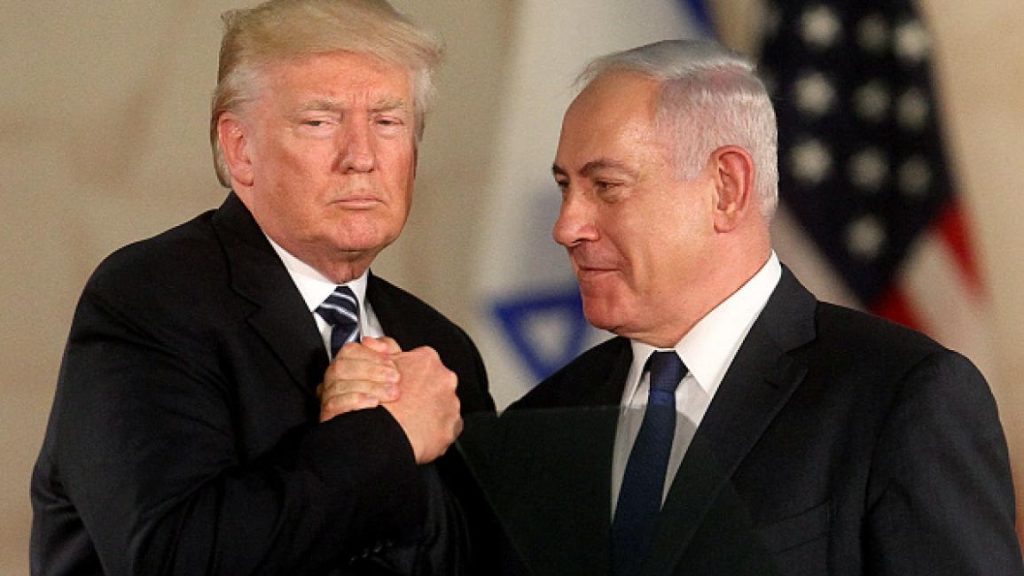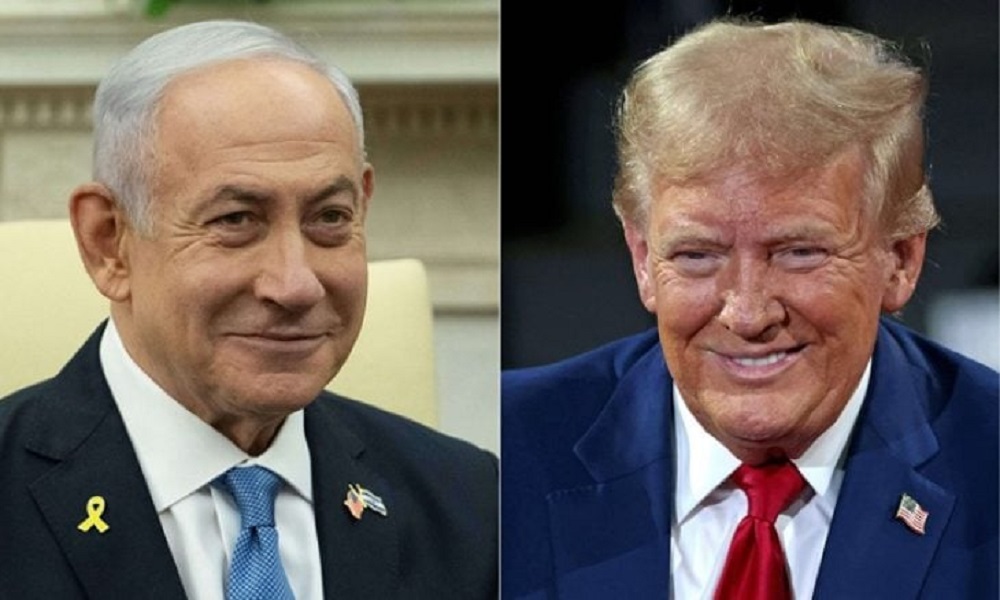Watan-Under the title “Trump’s Grand Plans in the Middle East,” the French newspaper Le Monde reported that while Donald Trump is set to welcome Israeli Prime Minister Benjamin Netanyahu to the White House today, Tuesday, the U.S. president has spoken about the “temporary or long-term” displacement of Gaza residents and expressed readiness to negotiate with Iran, Israel’s ultimate enemy.
The French newspaper added that in the whirlwind of announcements and threats that have marked Donald Trump’s return to the White House, the Middle East has been a prominent issue. It took only a few days for Trump to make the expected commitments to a pro-Israel stance, consistent with his first presidential term (2017-2021). With this visit to Washington, Prime Minister Benjamin Netanyahu has become the first foreign leader to visit the U.S. capital since Trump reassumed power on January 20.
Trump’s Stance on Iran
However, Donald Trump also stated that he is willing to negotiate with Iran, Israel’s absolute adversary. The scope of these negotiations remains unclear: Will they focus solely on Iran’s nuclear program, or will they also cover ballistic weapons and regional security?
During his election campaign, Le Monde notes, Trump promoted the idea of exerting “maximum pressure” on Tehran, primarily through economic means, and promised to prevent Iran from acquiring a nuclear bomb. This willingness to negotiate represents a notable but fragile opening from the man who withdrew the U.S. from the Joint Comprehensive Plan of Action (JCPOA) in 2018, three years after its signing.
In the first week of his new term, the French newspaper explains, Trump made two significant breaks from his predecessor Joe Biden. He lifted sanctions on Israeli settlers responsible for violence in the West Bank and resumed the supply of 1,000-kilogram bombs to the Israeli military, which have caused massive destruction in Gaza. Additionally, his special envoy, Stephen Witkoff, pledged to implement ceasefires in Lebanon and Gaza. The former is expected to facilitate an Israeli withdrawal, while the latter is aimed at securing the release of hostages.

The October 7th Effect
According to Le Monde, Trump wants to resolve this war quickly so he can focus on normalizing relations between Saudi Arabia and Israel. He appears to have underestimated the regional impact of the October 7th attacks across Middle Eastern countries.
Aaron David Miller, a veteran U.S. diplomat, stated that Gaza will be “the first foreign policy crisis of Trump’s administration.” He added: “Negotiations for the second phase of a ceasefire between Israel and Hamas, which took effect on January 19, must begin. But it is pure fantasy to believe that the current Israeli government will abide by the conditions, end the war, and withdraw its army.” The key question is what leverage Trump has over Netanyahu. Miller commented:
“I find it hard to imagine Trump resorting to measures that Biden refused to use for fifteen months, such as freezing or conditioning military aid to Israel.”
Trump’s Remarks on Gaza
Le Monde also highlighted Trump’s statements about Gaza, which have drawn significant attention. He described the Palestinian enclave as a “demolition site” and suggested that Egypt and Jordan take in some of its displaced residents. On January 25, he said:
“We are talking about one and a half million people, and we are just cleaning this whole thing up” (referring to temporary or long-term displacement).
The French newspaper noted that Trump’s proposal, which disregards the desires of Gaza’s residents, also fails to consider Egypt’s and Jordan’s national interests. Both countries, along with the Arab League, rejected the idea outright, under any circumstances or justifications. The day before, Trump insisted:
“They will do it. We do so much for them.”
Commenting on these remarks, Aaron David Miller described Trump’s approach as “the opportunistic mindset of a real estate broker who turns everything into a business proposal.” He added:
“This idea will resurface because it aligns perfectly with the Israeli right’s agenda. This is especially true since Hamas will remain alive as an insurgent movement capable of either intimidating or co-opting any form of Palestinian governance—whether a technocratic committee or the return of the Palestinian Authority.”
Le Monde argued that the temptation to “cleanse” Gaza has been a long-standing ambition within Trump’s inner circle. His so-called “Deal of the Century,” unveiled in January 2020, called for moving past “unproductive old narratives” and promised that Palestinian territories could become “a regional trade hub, akin to Dubai or Singapore.”
In March 2024, Jared Kushner, one of the architects of this plan, discussed Gaza’s potential in a Harvard University interview. Trump’s son-in-law and former adviser stated:”The beachfront real estate could be very valuable, and the Israelis could relocate the people and clean up [the area].”
The Iranian Challenge
The Iranian issue also poses a major challenge for Trump, who withdrew from the nuclear deal and dismissed it as a “terrible one-sided agreement.” His Democratic successor, Joe Biden, tried unsuccessfully to revive the deal with European partners, while facing accusations from Republicans of being too weak on Iran.
Today, Trump faces a new reality: Iran is closer than ever to obtaining a nuclear bomb. However, its regime has no desire for open confrontation, Le Monde explains. On January 13, in a meeting in Geneva with European diplomats, Iranian officials made it clear they were open to negotiations.
Following the election of Masoud Pezeshkian as Iran’s president in the summer of 2024, Tehran has been geopolitically weakened more than at any time in decades. This is due to Israel’s successful strikes against Hamas in Gaza, Hezbollah in Lebanon, as well as inside Iran itself and against Houthi rebels in Yemen. Iran’s layers of security and its Middle Eastern proxies have suffered significant blows, Le Monde notes.
At the same time, Iran’s nuclear program has accelerated. According to the International Atomic Energy Agency (IAEA), Iran now possesses around 200 kilograms of uranium enriched to 60%, dangerously close to the 90% weapons-grade threshold. Experts estimate that Iran could have enough fissile material for four to five nuclear warheads in less than two weeks. By contrast, when the JCPOA was fully implemented, this timeframe was 12 months.
Iran’s Economic Hardships
Rafael Grossi, the IAEA director, warned at the World Economic Forum in Davos (January 20-24) that “the Iranians are stepping on the gas pedal.” However, Le Monde suggests that Iran may be interested in negotiations for the sake of the process itself rather than its outcome.
Iran has not forgotten that in January 2020, during Trump’s first term, he ordered the assassination of General Qasem Soleimani, the powerful leader of the Quds Force in Iran’s Revolutionary Guard.
Ali Vaez, an analyst at the International Crisis Group, noted: “Iran’s economy is struggling, and a partial lifting of sanctions could bring relief. Some in Iran believe Trump has a unique ability to pressure Congress into making a deal—something Obama couldn’t do and Biden was unwilling to attempt.”
However, Iran faces two key problems, according to Vaez:
- No direct communication channel with Trump, who is surrounded by advisers opposed to any beneficial deal with Tehran.
- Uncertainty over what kind of offer would interest Trump, who prefers simple, high-impact proposals.
Widespread skepticism exists among experts. Nuclear affairs specialist James Acton of the Carnegie Endowment for International Peace remarked: “I think the U.S. negotiation goals are highly unrealistic. While Iran is weaker geopolitically, it still holds many bargaining chips in the nuclear domain. I doubt the U.S. can secure a better deal than the JCPOA. Frankly, we made a mistake by pulling out of the agreement. Why would Iran trust us if we promise only a partial lifting of sanctions? I don’t believe the Trump administration is willing or capable of engaging in lengthy, technical nuclear negotiations.”
Meanwhile, European signatories (UK, France, Germany) to the nuclear deal are moving toward reimposing international sanctions on Iran for failing to meet its commitments. They have until October 18 to decide, according to a UN Security Council resolution.
Trump’s Image as a ‘Peace Candidate’
Trump campaigned as a “global peace candidate” and is unwilling to involve the U.S. in a new war. However, Israel’s potential military action against Iran could resurface.
In Washington, the temptation to outsource such action may grow, Le Monde suggests. James Acton stated:
“Netanyahu has reasons to consider a strike on Iran. Trump might give the green light but is unlikely to involve the U.S. directly.”
-
-
-
-
-
-
